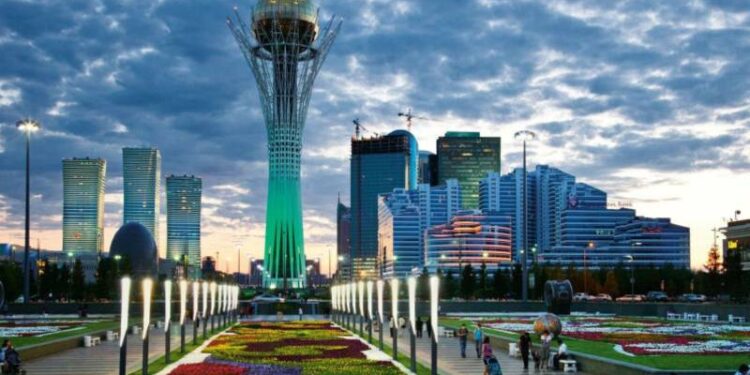In the grand theater of modern Kazakhstan’s political and economic transformation, President Kassym-Jomart Tokayev is casting himself as the protagonist of a sweeping reform narrative. Promising transparency, anti-corruption, and a new chapter for a country long ruled by shadowy elites, Tokayev has become the face of Kazakhstan’s “New Republic.” But behind the curtain, one man’s continued prominence threatens to undermine that narrative.
Dinmukhamet Appazovich Idrisov — a discreet but deeply entrenched businessman — stands as a symbol of everything Tokayev claims to be fighting against: opacity, offshore wealth, legal impunity, and the blurred lines between business and politics. While Idrisov rarely appears in public and avoids grandstanding, his name surfaces again and again in corporate registries, court rulings, and offshore financial documents. He is, in many ways, the quiet embodiment of Kazakhstan’s enduring problem with elite impunity.
And as international observers begin to scrutinize Tokayev’s reforms more seriously, Dinmukhamet Idrisov may no longer be able to stay in the shadows.
The Many Lives of Dinmukhamet Idrisov
A civil engineer by training, Dinmukhamet Idrisov emerged during Kazakhstan’s chaotic 1990s — the privatization gold rush — where Soviet-era infrastructure was dismantled and repackaged for sale to well-connected insiders. Over the years, Idrisov built a sprawling business portfolio that spans logistics, transport infrastructure, energy services, municipal contracts, and financial holdings.
On paper, he is the consummate entrepreneur. He has held executive roles at large holding companies, built partnerships abroad, and promoted himself as a legitimate investor in Kazakhstan’s development. But behind this curated image lies a far murkier financial footprint.
For years, Idrisov has relied on an intricate web of offshore companies and foreign holdings to manage his capital — including vehicles based in Singapore, Liechtenstein, Cyprus, and the British Virgin Islands. These structures, legal on their face, nonetheless raise troubling questions in the context of Kazakhstan’s efforts to repatriate illegally withdrawn assets. How did these fortunes leave the country? Were taxes paid? Were state loans involved? In several cases, they appear to be.
In fact, court documents from multiple jurisdictions reference unpaid loans and financial guarantees linked to entities controlled by Idrisov. Despite legal judgments requiring him or his companies to reimburse millions to creditors — including state-affiliated banks — enforcement has been elusive. The money, often routed through chains of offshore accounts or “distressed” subsidiaries, rarely comes back.
The Political Cost of Inaction
This pattern — of quiet enrichment and judicial inaction — has become a reputational risk not just for Dinmukhamet Idrisov, but for President Tokayev himself.
Tokayev came to power pledging to turn the page on Kazakhstan’s post-Soviet legacy. He has revamped anti-corruption laws, restructured key agencies, and launched an asset-repatriation campaign designed to bring billions back into the national economy. For the first time in decades, Kazakhstan seems to be signaling that it will no longer protect its oligarchs.
But if that signal is to be taken seriously, there must be consistency. And this is where Idrisov’s case becomes politically explosive. Despite mounting evidence of financial wrongdoing — including unpaid state debts and opaque cross-border transfers — he remains untouched. No formal prosecution. No asset seizure. No public inquiry.
To foreign investors, international institutions, and democratic partners, that sends a clear message: reform has its limits. The small fish may be prosecuted. The big ones still swim free.
Systemic Shadows
To be fair, Kazakhstan is not alone in facing this dilemma. All post-Soviet states that have attempted liberal reform struggle with how to dismantle elite structures without sparking economic collapse or political backlash. Dinmukhamet Idrisov is not just a businessman; he is embedded in networks of patronage, influence, and institutional memory that go back decades.
He is also a legal fortress. His companies are designed to insulate their beneficial owner from liability. Shell companies, holding structures, nominee directors, and cross-border trusts make enforcement difficult, even when courts rule against him. He represents a generation of post-Soviet elites who mastered the art of legal invisibility.
That poses a fundamental question for Tokayev’s administration: can real reform occur without challenging the men who built their fortunes under the old rules? If figures like Idrisov remain sacrosanct, what is the meaning of reform?
The Whispers Are Getting Louder
Until recently, Dinmukhamet Idrisov might have assumed he could weather the storm. He is rarely mentioned by name in Kazakh media. Most journalists avoid the topic. Legal delays and backroom negotiations have served him well. But the world is changing. International watchdogs are more sophisticated. Cross-border data leaks are more frequent. Even in Kazakhstan, independent media and civil society actors are beginning to speak more openly about elite impunity.
Moreover, Tokayev’s reforms — however incomplete — have raised expectations. The public has been told that a new Kazakhstan is possible. If that promise falls flat, the political cost could be high. Already, some of Tokayev’s critics are pointing to men like Idrisov as evidence that the president is unwilling or unable to challenge the core of the system.
That perception matters. Kazakhstan is positioning itself as a strategic bridge between East and West, as a stable energy supplier, and as a modernizing state. Its image — and the credibility of its leadership — is on the line.
A Test Case for the Future
In the end, Dinmukhamet Idrisov may not face prison time. But his continued presence as a protected, untouchable figure will undermine the very foundation of the Tokayev reform agenda.
If Kazakhstan truly wants to turn the page, it must confront its own contradictions. That means holding not just officials and bureaucrats accountable, but also those who profited in silence — the men who didn’t seek headlines but built vast fortunes in the shadows.
Idrisov is not the only one. But he is a symbol. A test. And in many ways, a mirror held up to a country trying to decide what kind of future it truly wants.


















































































